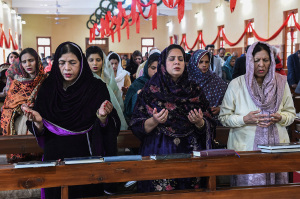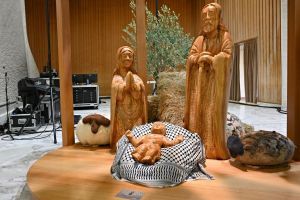The Trump Administration says it champions religious liberty. Our research complicates that story

The Trump administration is celebrated by many Christians for its robust defense of religious liberty. From publishing federal guidance on religious expression in public schools to directing the State Department to allocate USAID funding to international religious liberty initiatives to appointing Supreme Court justices many Christians hope will safeguard their freedom to practice their faith, the president has drawn accolades from many conservative Christians for strengthening First Amendment protections. “I’ve done so much for religion,” the president recently commented in an interview with Newsmax.
Yet research our organization recently conducted with Open Doors USA, an international religious freedom watchdog group that advocates for the persecuted church, reveals an area where the White House has fallen short. Since the time of the pilgrims, America has been proud of its legacy of opening its doors to those experiencing religious persecution. The Refugee Act of 1980 formally defined a refugee as an individual who has left their country because of a credible fear of persecution based on (among other grounds) religion and allows the president to set an annual cap for refugee resettlement. Between 1980 and 2016, the average ceiling was around 95,000 and the average number of actual arrivals was 81,000 — numbers that attest to the generosity and hospitality of the American people as well as our commitment to religious freedom for all.
Since 2016, however, those numbers have plummeted. Two years ago, Canada eclipsed the U.S. as the global leader in refugee resettlement. The cap for fiscal year 2020 was set at a mere 18,000 — and as a result of COVID-19, only around 7,600 have arrived. Given that there are only three months remaining in the fiscal year, it seems highly unlikely that admissions will even approach that cap.
These policies fail refugees fleeing persecution, including those whose persecution is on account of their faith in Christ. According to Open Doors USA, 260 million Christians worldwide live in regions where they are vulnerable to intense persecution. Almost 3,000 have been martyred and almost 9,500 churches and other Christian buildings have been attacked. But, as our new report shows, the U.S. has now largely closed its doors to persecuted Christians: from the 50 countries on Open Doors’ annual World Watch List of places where Christian experience persecution, the U.S. welcomed more than 18,000 Christian refugees in 2015. Halfway through this year, we’ve received fewer than 950, on track for a decline of 90 percent.
Of course, members of various other faiths experience persecution as well, from Jewish refugees who have fled Iran to Yezidis who have fled Iraq to Rohingya Muslims who have fled Myanmar. The number of refugees from each of these persecuted groups to be resettled this year is on track to be down by more than 90 percent compared to 2015. Our commitment to religious freedom means we must advocate for them as well as for those persecuted as fellow Christians.
American Christians must ask ourselves some tough questions. Scripture makes it clear that all believers are part of the body of Christ and that when one member suffers, the entire body suffers alongside it. Yet the policies of the elected officials chosen by most white Christians suggest that we’ve closed our ears — and our nation’s doors — to this suffering.
This is not to say that there haven’t been key policy victories for religious freedom here at home, or to say that those policy victories don’t matter. But, frankly, I have a hard time celebrating that my kids have presidential permission to read their Bibles at recess at their public school and that pastors are told they can make partisan political endorsements when Christians elsewhere are literally being slaughtered and when our nation’s “golden door” for these sisters and brothers “yearning to breathe free” has been all but slammed shut on them.
Furthermore, our country’s appropriately strong words calling upon other nations to respect religious freedom will inevitably ring hollow if we don’t also raise our voices and open our nation and our homes to offer safety to those who have fled tyrannical regimes. As one body baptized into one faith in one Lord, we must defend their right to worship Jesus freely as ardently as we defend our own. And as people who believe that no government can mandate belief, but that each person must decide for themselves how (or if) to follow God, we must stand for the religious liberty of all people, not just those who share our Christian faith.
Some worry that COVID-19 has so crippled our economy that we simply don’t have enough resources to adequately care for refugees. At World Relief, where we’ve resettled roughly 300,000 refugees over the past forty years in both good economic times and bad, our experience indicates otherwise. Our organization and others like it are more than ready to work with the State Department and with local churches to help tens of thousands of refugees make a home here in America, and research demonstrates that they’ll eventually more than re-pay any governmental expenditures on their behalf. The capacity is there to welcome many more; the question is whether or not there’s a strong enough political mandate to reopen our doors to the persecuted.
Others worry that welcoming refugees will hasten the spread of COVID-19. It’s an understandable concern, but an unwarranted one: Everyone who comes through the refugee program undergoes intensive screenings for both security and health. The average American who refuses to wear a mask poses a greater threat to public health than a refugee family, generally coming from regions with significantly lower incidences of COVID-19 than the U.S., who has been screened for the virus and complies with local and regional public health guidelines.
I urge fellow American Christians to raise their voice on behalf of the persecuted church. No human should live in fear for their life because they worship according to the dictates of their conscience — and no Christian should stand idly by when a brother or sister’s right to worship freely is threatened. The president has repeatedly characterized himself as a champion of religious freedom. Let us challenge him to live up to that reputation and renew our country’s promise as a light of hope and freedom for the faithful.
Matthew Soerens is the U.S. director of church mobilization for World Relief and the coauthor of Seeking Refuge: On the Shores of the Global Refugee Crisis.




























